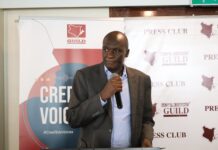Stephanie Wayua
Nairobi, Kenya: Serile Awinja popularly known as “Senje” is a 79-year-old woman from Riruta Satellite, Dagoretti South Constituency in Nairobi Kenya. Senje has been living with a disability since 1989 when she was attacked by her nephew in her home in Huruma.
Despite being paralyzed from the waist down she has beat the odds and overcome life’s challenges to sustain herself as she has no husband or children. Before the Covid-19 pandemic, Senje used to earn a living using her skills in dress-making and tailoring in her shop located in Riruta Satellite along Kabiria Road.
With the support from local community, she could supply uniforms to both public and private schools in Dagoretti and also embroider labels on the uniforms and other designs.
“I always give thanks to God even though I lost my ability to move around and do tons of the businesses I was used to. But God gave me the skills on my hands for a purpose” she says with gratitude.
Like other persons living with disabilities after the Covid-19 pandemic struck, Senje was forced to stay home due to her old age to limit interactions with other people and this dealt a huge blow to her livelihood. She did not relent, she kept working from home and was able to make a paltry living.
“After this pandemic began, I was not able to do business like before because of the lockdowns and quarantine. Most schools closed and orders were not coming in like before Life was very difficult, I depended on friends, well-wishers and my brother for food and sometimes even struggled to pay rent“ she says.
Adding “In 2021 I developed a serious cough and after seeking treatment was diagnosed with TB. After sorting treatment from the local dispensary at Kivuli and the Mbagathi Referral Hospital, I was cured but I did not give up I continued working.”
The Covid 19 pandemic forced everyone to switch from their normal way of life and adapt to sustain themselves.

The third born in a family of 6, Senje has been able to use her skills in dress-making and crocheting from the traditional way of sewing and embroidery. Despite her old age and the competition brought about by the digital revolution, she has been able to remain innovative thanks to the connections and network she has built.
She was able to purchase an electric machine using funds that were distributed by the government to vulnerable members of the community during the pandemic. This assisted her in producing sweaters, beanies, and masks in large quantities to meet demand.
In early 2022 her tailoring business went down and Senje was not making enough money to sustain herself. She then moved to selling sweets through hawking using a wheelchair. This at least could earn her some money.
“Through Psycho-social support from my doctors and social groups with my neighbors I was able to start vending sweets. This was the only way to survive. I depended on one young man and a few neighbors who used to push me in my wheelchair. It was never easy especially when there was no one to help me, narrates Senje.
Peter Wekesa, a 17-year-old boy narrates how he supported Senje through her daily struggle.
“Every time I am free, I would push Senje on her wheelchair as she sold sweets. When I was busy I would leave her at the stage and call her in the evening after football practice to bring her back home,” Peter noted.
Just like Senje, most persons living with disability rely on formal support from assistants or service providers or informal support from relatives/friends. Services like one-on-one counseling were not and still are not easy to find as most PWDs are impoverished.
Fortunately, she received assistance from her social worker Pauline Mwende of Kivuli Dispensary.
“I used to go visit Senje almost weekly to help her with house chores, cooking even bringing foodstuff for her. Fortunately, Senje is very hardworking despite her old age. She is not one to always go begging on the streets. Even when she feels low, she would tell me; Mwende my daughter today I’m feeling down. We could have a cup of tea and tell stories.” noted Mwende.
Theresiah Wangui a mental health expert at the Mutuini Level 4 Hospital explains that people living with disability especially women were severely affected mentally by the pandemic with the loss of their jobs or source of income.
‘’During and after the pandemic, we dealt with a lot of cases whereby one is dealing with depression and trauma because maybe he/she lost a job. What we did more was to help them recover.’’
According to an ethnographic research report done in Kenya and Bangladesh by the International Disability Alliance (IDA) in Kenya alone, more than 92% of respondents said their daily lives had been affected, pinpointing factors such as limited transport, restricted movement, lack of available necessities, lack of contact with others in schools, church, and other social functions, reduced income and the loss of their job or income.
A disability-inclusive crisis response will better serve everyone in the future, by providing more inclusive, accessible, sustainable, and agile systems that are able to respond to complex situations and reach those that are most in need.
This publication was produced with the financial support of the European Union. Its contents are the sole responsibility of Stephanie Wayua and do not necessarily reflect the views of the European Union.














Wow what a piece. That Story is really touching and encouraging. There are women out there who are really strong. Thank you for this Stephanie.
Comments are closed.